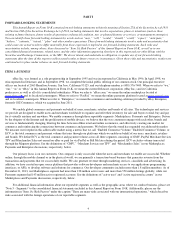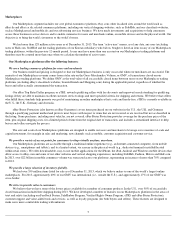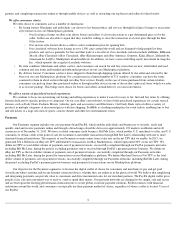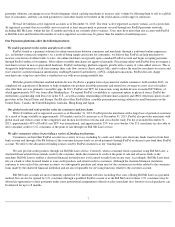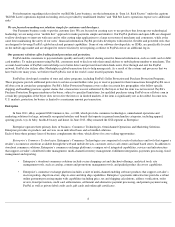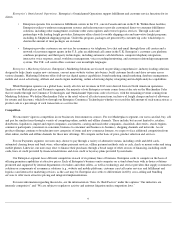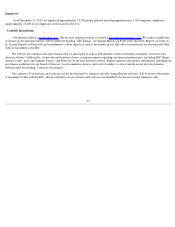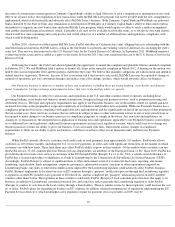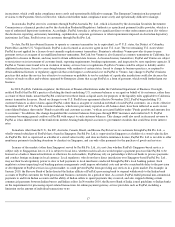eBay 2013 Annual Report Download - page 16
Download and view the complete annual report
Please find page 16 of the 2013 eBay annual report below. You can navigate through the pages in the report by either clicking on the pages listed below, or by using the keyword search tool below to find specific information within the annual report.
commitments. As a result, we may be unable to adjust our spending rapidly enough to compensate for any unexpected revenue shortfall, which
may harm our profitability.
The growth of Internet users is slowing in many countries where we have a significant presence. As our growth rates in established markets
slow, we will increasingly need to focus on keeping existing Marketplaces users (especially our top buyers and sellers) and PayPal account
holders (especially in our merchant services business) active and increasing their activity level on our websites and mobile platforms in order to
continue to grow those businesses. The growth of Internet users is accelerating in some countries and regions where we do not have a significant
presence (e.g., Brazil/Latin America, Russia, China and certain other countries in which we do not have a meaningful (or, in some cases, any)
domestic business). If we are unable to establish our businesses and drive adoption of our services in such markets, our future growth would be
negatively impacted. If users in such markets exhibit different behaviors than those from our more developed markets, we might see fewer
interactions, lower levels of engagement, lower conversion, and/or lower values of each interaction or conversion, and our businesses could be
harmed.
Mobile commerce and mobile payments represent an increasingly important part of our businesses. Our users who have joined, and/or
primarily interact with, us through mobile devices may exhibit different behaviors than our more traditional Internet ecommerce and payments
users. If this results in fewer interactions, lower levels of engagement, lower conversion, and/or lower values of each interaction or conversion,
our businesses could be harmed.
Our Payments business continues to face increased competitive pressure, including from relatively new competitors and large Internet
companies. In particular, user sophistication and technological advances have increased expectations around the user experience for online and
mobile payments, including speed of response and ease of use for both merchants and consumers. If we are unable to continue to adapt our
services in ways that improve the user experience and increase user engagement, our growth in revenue and global active accounts may be
negatively impacted, which could harm our business.
Our Marketplaces business continues to face increased competitive pressure online and offline. In particular, the competitive norm for, and
the expected level of service from, Internet ecommerce and mobile commerce has significantly increased, due to, among other factors, improved
user experience, greater ease of buying goods, lower (or no) shipping costs, faster shipping times and more favorable return policies. If we are
unable to change our services in ways that reflect the changing demands of the Internet ecommerce and mobile commerce marketplaces,
particularly the higher growth of sales of fixed-price items and higher expected service levels (some of which depend on services provided by
sellers on our platforms), our business will suffer.
We regularly announce changes to our Marketplaces business intended to drive more sales and improve seller efficiency and buyer
experiences and trust. Some of the changes that we have announced to date have been controversial with, and led to dissatisfaction among, our
sellers, and additional changes that we announce in the future may also be negatively received by some of our sellers. This may not only impact
the supply of items listed on our websites, but because many sellers also buy from our websites, it may adversely impact demand as well. Given
the number of recent changes that we have made and continue to make to our policies and pricing, it may take our sellers some time to fully
assess and adjust to these changes, and sellers may elect to reduce volume on our websites and mobile platforms while making such assessments
and adjustments or in response to these changes. If any of these changes cause sellers to move their business (in whole or in part) away from our
websites and mobile platforms or otherwise fail to improve gross merchandise volume or the number of successful listings, our operating results
and profitability will be harmed.
We believe that the mix of sales under our traditional auction-style listing format and fixed-price listing format will continue to shift
towards our fixed-price format. Accordingly, we have eliminated some of the features related to our traditional auction-style format and expect
others will continue to become less meaningful to, and used less frequently by, our sellers, resulting in a corresponding decrease in revenues
from those features. We also expect that the costs associated with our seller discount programs will continue to increase as more sellers become
eligible for such discounts. In addition, because a large percentage of PayPal transactions originate on the Marketplaces platform, declines in
growth rates in major Marketplaces markets also adversely affect PayPal's growth. The expected future growth of our PayPal, Enterprise,
StubHub and our other lower margin businesses may also cause downward pressure on our profit margins because those businesses have lower
gross margins than our Marketplaces platforms.
14


